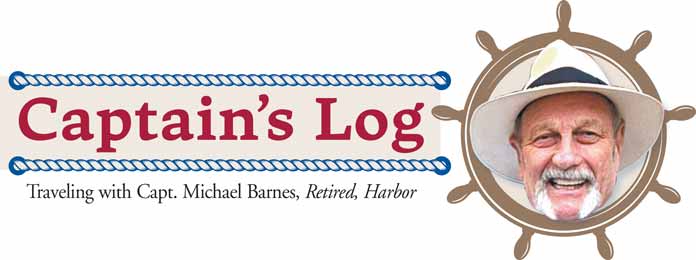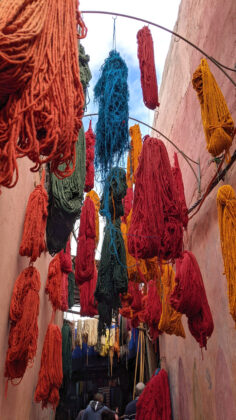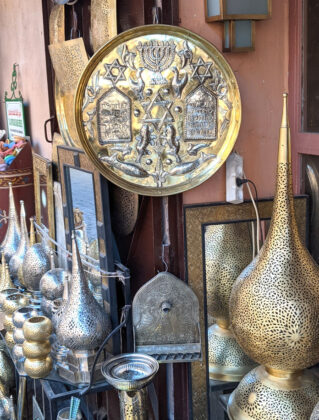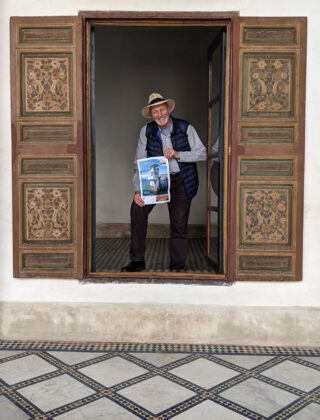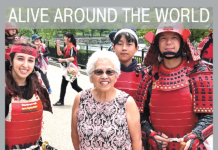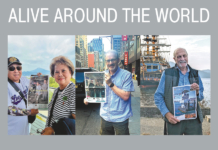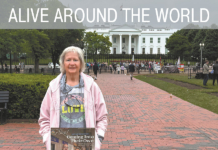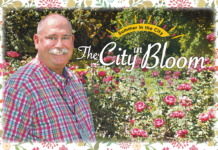 Send in your ALIVE! AROUND THE WORLD
Send in your ALIVE! AROUND THE WORLD
Take Alive! with you wherever you go! Bring your recent copy of Alive! with you when you travel and snap a high resolution photo of you holding Alive!
Send in your pictures and descriptive text using the online form, and we’ll publish it.
SUBMIT YOUR ALIVE! AROUND THE WORLD
Pirates, Islam and the French
Letter From Morocco, Pt. 1
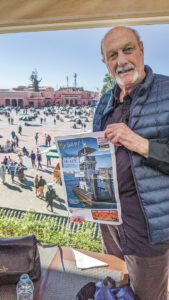
Morocco during winter with its clear, star-filled nights, is a land of mystery and adventure just waiting to be explored. If you visit this fascinating country, you will wonder at the impressive imperial cities, with their ancient rainbow-hued souks (markets) and beautiful palaces, and gaze at mind-blowing sunsets over the Atlas mountains, which are surrounded by the vast golden sands of the Sahara desert.
So, whether you are just spending a couple of hours visiting from a cruise ship, hiking across the Sahara on a five-day camel safari, or just renting a riad (apartment) and exploring the souks, this is the perfect time to enjoy this lovely country. Fewer crowds make it easier to get around and experience the culture and gastronomic pleasures that await. Centuries of imperial and commercial interaction have created a melting pot of tempting recipes and delicious dishes made from locally grown fresh fruit and vegetables. Inimitable spices and herbs bring dishes to life and complement the many
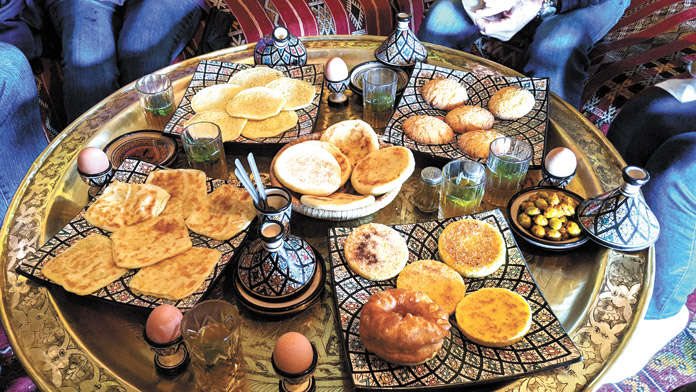
seafood and meat specialties. One of the best green peppercorn steaks I have ever tasted came from a restaurant in Marrakech, accompanied by the ever-popular side dish of couscous – this time using a knife and fork! Traditionally couscous is eaten without flatware as it is common to use one’s three fingers of the right hand to eat the dish.
Although there is no dress code in Morocco, most of its citizens follow “modesty rules” as respect for the Islam. Muslims generally do not resent the restrictions placed on their dress by their religion, and most regard it as a proud statement of their faith. Therefore, it is respectful to dress properly, and not wear tight clothing or show too much flesh, even in the heat of summer.
Unlike in California, cannabis (hashish) is not legal but it is widely used and tolerated. Morocco is the biggest producer of cannabis in the world and it is grown mainly near Chefchaouen, which is known for its striking, blue-washed buildings, south of Tangier in the Rif Mountains.
There are three languages spoken — Arabic, Berber (Amazigh) and French, since independence from the colonial control of France. When King Mohammed VI became king in 1999, the Royal Harem of 40 concubines was dissolved, women were granted the same rights as men, and English instead of French was taught as the international business language in schools.
Morocco is quite a liberal country in comparison to other Muslim nations; alcohol is served, but only in licensed hotels, bars and tourist areas. Drinking alcohol in the street is not allowed and can get you into serious trouble if you are caught breaking the law. However, due to high taxes, alcohol is expensive in Morocco, so bring duty-free alcohol with you to drink in your accommodation.
Moroccan cities have many fountains, and although you may see the locals drink the water, it is not a good idea for tourists to try it. Just step back and admire the fountain, take photos, and definitely stick to bottled mineral water!
Trains between cities are fast and clean, and take away the stress. Everyone gets to see more of the local scenery, but you will still need transport when you arrive. There is a great highway system, but I would not recommend renting a car; hire a driver or take a tour as the guides speak and read the languages. Specific tours can be arranged via TripAdvisor or through your hotel for camel, hot air balloons, or truck adventures.
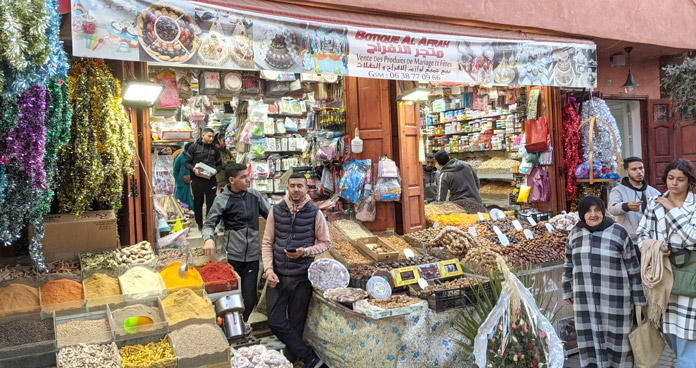
Local people are very friendly, and it is safe to wander around the souks and markets, however, remember that no place on the tourist route is free from pickpockets, so keep flashy jewelry and expensive cell phones hidden. I recommended wearing a small crossbody purse that cannot be opened easily like backpacks or flimsy purses.
Very few stalls in the souks have their prices marked up, but you must haggle. My advice is to compare the cost to a similar article in your home country, convert that into local currency, then offer less. If that does not get the desired price, walk away. The shopkeeper will chase after you or throw his hands in the air. When buying silver objects, be aware of the authenticity of the silver – real silver has 250 stamped on the object. If it does not have a stamp, then pay less!
Local money can be obtained only in Morocco and at limited places, but credit cards and foreign cash are accepted.
Moroccan History in Brief
For some 2,000 years, the country was controlled by a variety of Berber tribes until the eighth century BCE, with the arrival of its first invaders the Phoenicians, followed by the Carthaginians, Romans, Vandals, Byzantines, and Visigoths. But with the arrival of Islam in 791 AD and the creation of the first Moroccan State, it could finally keep powerful invaders at bay.
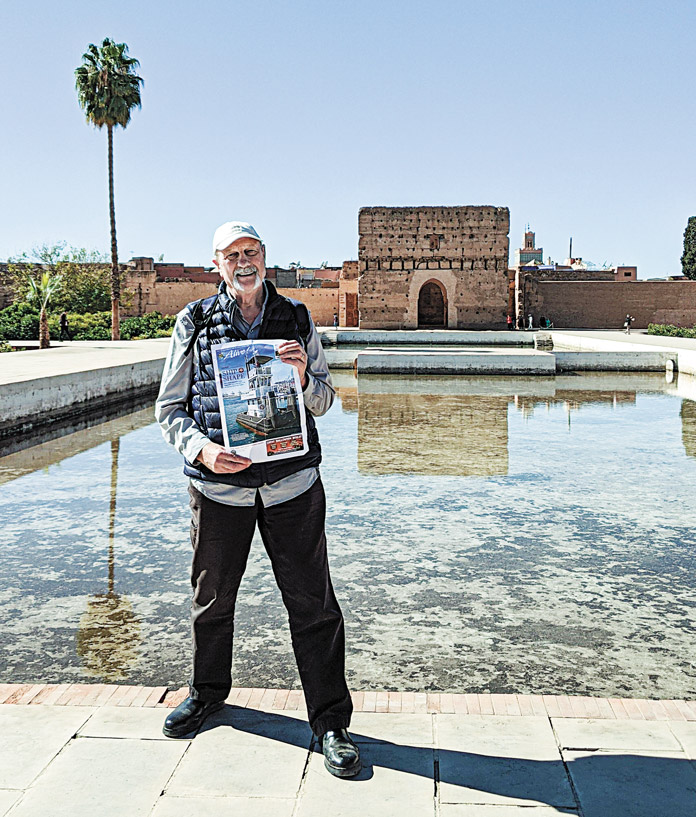
Morocco became the trade crossroad for the African and the European continents, dealing in salt, sugar and spices. Sadly, it was also the center of the Trans-Saharan slave trade route from Timbuktu to the slave market in Marrakesh.
While under French control the slave markets were officially closed, but slavery still took place. Slavery in the country was dissolved along with the Royal harem only when King Mohammed VI ascended to the throne in 1999.
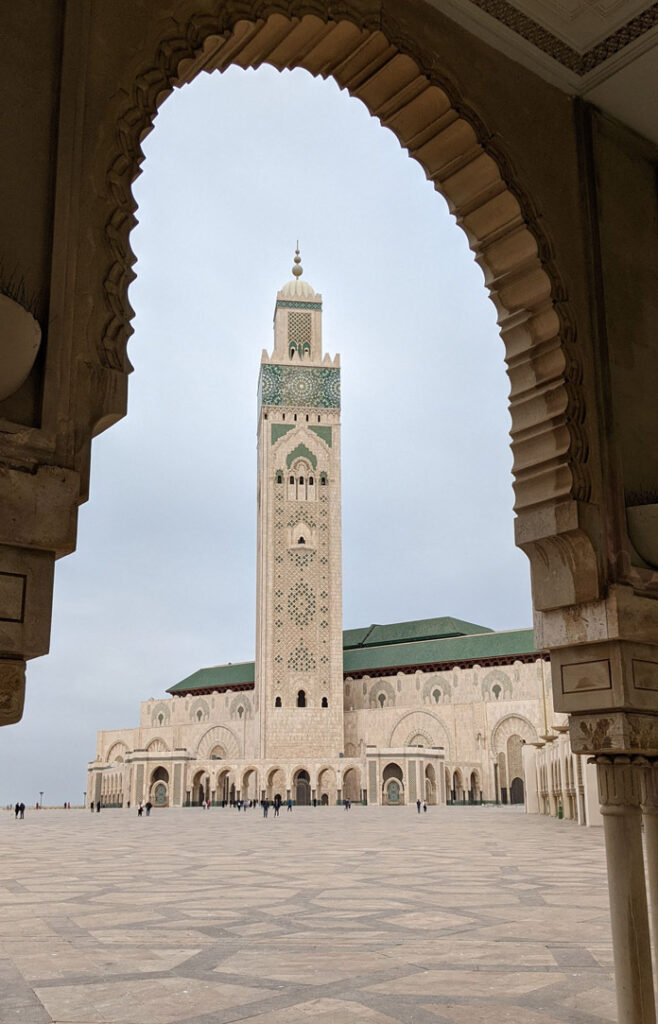
Morocco from medieval times until the late 1800s was known for its Barbary pirates, who attacked shipping and raided as far north as Ireland and southern England looking for slaves. In 1675 Britain had enough of these pirates and sent the Royal Navy to bombard the ports of Tunis and Tripoli into submission, giving them the order to cease and desist. Years later during the American Revolutionary War, Sultan Mohammed III of Morocco was the first ruler to recognize America as an independent country, and to this day is America’s oldest non-broken friendship treaty with a foreign power. Although the Sultan did ask to allow American merchant ships to enjoy safe passage along his coastline.
Twenty-eight years later in 1801, when Thomas Jefferson became President, the pirates increased the tribute, and in answer to the Sultan’s request, America sent warships to bombard the pirate havens. The pirate threat was finally subdued by the French conquest of neighboring Algeria. In 1830, following the assassination of European citizens, the French occupied Casablanca. France finally pacified the country after 22 years of military oppression and limited cooperation from local chiefs.
In 1927, King Mohamed Ben Youssef (Mohamed V) was proclaimed Sultan of Morocco. As protector of all his subjects, he fiercely defended the Moroccan Jews against the Vichy French regime of World War II. After the war, King Mohammed V spent years negotiating with the French for independence but failed, and in 1953 along with the whole royal family, he was exiled to Madagascar.
However, with France’s problems in Algeria and Indochina (Vietnam), the royal family returned home unopposed after two years, and independence from France and Spain was finally recognized in 1956. Today Morocco is a thriving country, tremendously popular with tourists looking for a different kind of vacation.
The joys of being a traveler – it leaves you speechless, then turns you into a storyteller
– The Captain


